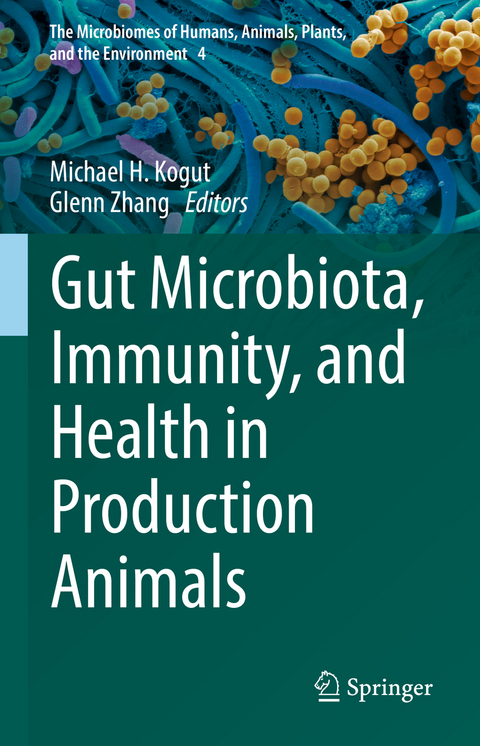
Gut Microbiota, Immunity, and Health in Production Animals
Springer International Publishing (Verlag)
978-3-030-90302-2 (ISBN)
The gut microbiome shapes health and susceptibility to disease and has become a leading area of research in the animal sciences. Gut health encompasses a number of physiological and functional features. Nutrient digestion and absorption, host metabolism and energy generation, a stable microbiome, mucus layer development, barrier function, and mucosal immune responses; all of which are required to interact to make an animal perform physiologically and according to its greatest genetic potential.
This carefully presented book broadens our vision, approach and results on gut health and the ability to regulate animal production. Understanding the chemistry of microbiomes has broad implications, including providing functional annotations for the microbial genomes, insights into the chemical languages that link microbes to each other and to their host, and translational implications for precision veterinary medicine, environmental health, and sustainable animal agriculture and welfare. Experts working in microbiome research, host immunity, and animal production, veterinarians and researchers in livestock science will understand the great importance of this volume.
lt;p>Dr. Michael Kogut is a Research Microbiologist and Lead Scientist at the Southern Plains Agricultural Research Center, College Station, TX. He received his Ph.D. in Poultry Science from the University of Georgia. Dr. Kogut has published over 200 peer-reviewed scientific papers, 11 book chapters, and has received 5 patents. Dr. Kogut's research has concentrated on the development of cost-effective immunological interventions to improve gut health by studying the role of the microbiota in immunity to infection; the role of dietary metabolites in promoting immune regulation and immune responses to pathogens; characterizing novel molecular targets that mediate the actions of dietary compounds in inflammation and immunity; and understanding the integration of central metabolic pathways and nutrient sensing with antimicrobial immunity.
Glenn Zhang is currently a professor and Boulware Endowed Chair in the Department of Animal and Food Sciences at Oklahoma State University. He received his Ph.D. in immunophysiology from Kansas State University and did postdoc work in molecular immunology at Yale Medical School. He has been working on the modulation of animal innate immunity and gut microbiota, with the long-term goal of developing effective strategies to achieve optimal animal health and production efficiency without relying on antibiotics. He has published more than 80 peer-reviewed papers and six book chapters on his research. He has also edited multiple special issues on gut health, gut microbiota, and alternatives to antibiotics for various scientific journals.
Chapter 1: Gastrointestinal Tract Barrier Efficiency: Function And Threats.- Chapter 2: Gut Health In Production Animals: Butyrate And Intestinal Homeostasis - Effects On The Intestinal Microbiota And Epithelial Hypoxia.- Chapter 3: The Role Of Farm Environment And Management In Shaping The Gut Microbiota Of Poultry.- Chapter 4: Enzymes And Gut Health In Monogastric Animals: Effects Beyond Digestibility.- Chapter 5: Gut Microbiome And Poultry Health.- Chapter 6: Influence Of Sow Gut Microbiota On Colostrum And Piglet Performance.- Chapter 7: Porcine Gut Microbiota And Host Interactions During The Transition From The Suckling To Post-Weaning Phase.- Chapter 8: Adaptive Poultry Gut Capacity To Resist Oxidative Stress.- Chapter 9: Gut Microbiota And The Gut-Brain Axis In Neonatal Calves: Implications For Psychobiotic Usage For Stress Regulation.- Chapter 10: The Gut Mycobiome And Animal Health.- Chapter 11: Immunological Mechanisms Of Probiotics In Chickens.- Chapter 12: Role Of Early Life Intestinal Microbiota In Modulating Immunity In Broiler Chickens.- Chapter 13: Managing Intestinal Health In Farm Animals: A Critical View.- Chapter 14: Pre- And Probiotic Effects On Innate Immunity And Metabolism In Cattle And Swine.- Chapter 15: The Unseen Minority: Biogeographical Investigations Of The Ruminant Gastrointestinal Microbiome Highlight The Importance Of Frequently Ignored Anatomical Regions.
| Erscheinungsdatum | 22.01.2022 |
|---|---|
| Reihe/Serie | The Microbiomes of Humans, Animals, Plants, and the Environment |
| Zusatzinfo | VII, 325 p. 11 illus., 8 illus. in color. |
| Verlagsort | Cham |
| Sprache | englisch |
| Maße | 155 x 235 mm |
| Gewicht | 661 g |
| Themenwelt | Naturwissenschaften ► Biologie ► Mikrobiologie / Immunologie |
| Veterinärmedizin | |
| Weitere Fachgebiete ► Land- / Forstwirtschaft / Fischerei | |
| Schlagworte | cattle • Chicken • gut-brain-axis • gut health • Gut microbiome • Gut Microbiota • Innate Immunity • Intestinal immunity • livestock • Metabolism • microbiota-gut-brain-axis • mycobiome • Probiotics • production animal • Swine |
| ISBN-10 | 3-030-90302-8 / 3030903028 |
| ISBN-13 | 978-3-030-90302-2 / 9783030903022 |
| Zustand | Neuware |
| Informationen gemäß Produktsicherheitsverordnung (GPSR) | |
| Haben Sie eine Frage zum Produkt? |
aus dem Bereich


